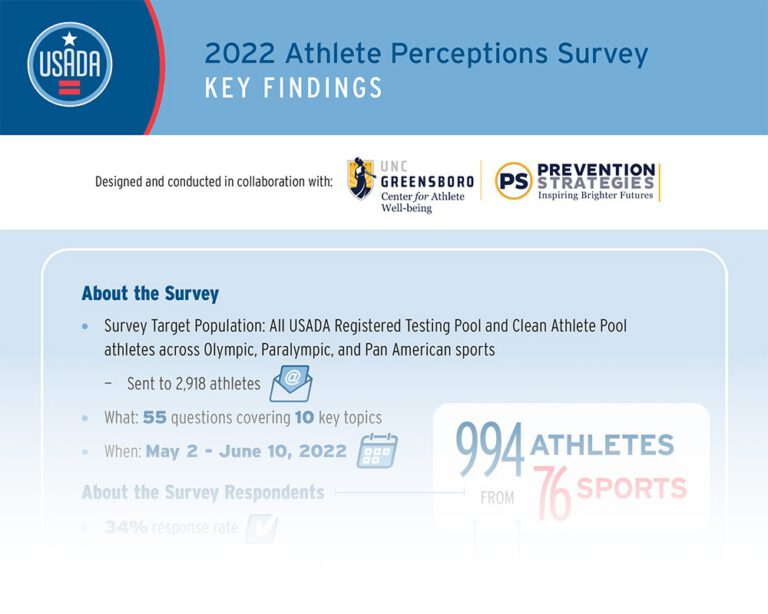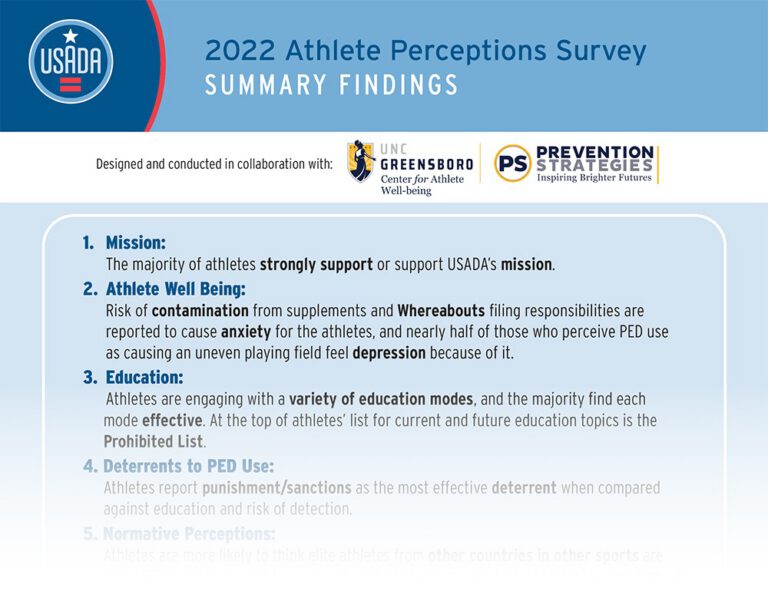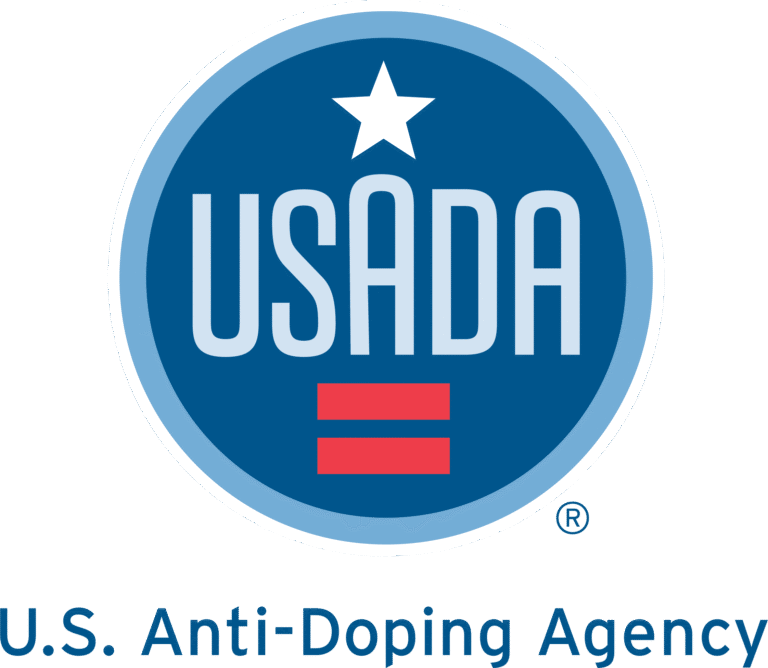USADA Funded Research
The broad range of anti-doping research activities previously undertaken by USADA were largely assumed by the Partnership for Clean Competition in 2009. However, USADA still considers funding research projects that have been presented to the PCC (or the World Anti-Doping Agency) first based on the guidelines from the USADA Research Priorities Policy (below). In the following section, you can also find detailed information about past USADA-funded research.
Funded Research Details
Detection of exogenous growth hormone, its analogs, mimetics, and secretagogues
| Title | Dates of Grant Funding | Principal Investigator | Institution |
|---|---|---|---|
| Center of Excellence Instrumentation Grants | 8/1/2007 – 8/30/2007 | Doug Rollins MD, PhD | SMRTL |
| Center of Excellence Instrumentation Grants | 3/24/2006 – 12/31/2009 | USADA Equipment on lease to Don Catlin MD | Anti-Doping Research Institute, Inc. |
| Displacement of growth hormone secretagogues – out of the receptor and out of the pitch- | 1/15/2006 – 12/31/2008 | Jordi Segura PhD | Institut Muncipial D’Investigacio Medica |
| Development of an immunoassay for a novel serum biomarker of GH administration | 1/1/2006 – 12/31/2006 | Robert Baxter PhD | University of Sydney |
| The Development of a methodology for detecting abuse with Growth Hormone in Sport: GH-2004-Pilot study on Ethnic Effects | 1/1/2003 – 8/1/2006 | Richard Holt MD | University of Southampton |
| Development and Clinical Validation of Sandwich Immunoassays for the Quantitation of Insulin-Like Growth Factor 1 and the N-Terminal Propeptide of Type III Collagen in Human Serum | 8/1/2002 – 10/25/2004 | Donald Very PhD | The Institute of Bioanalytics |
Detection of O2 transport-enhancing substances and methods
| Title | Dates of Grant Funding | Principal Investigator | Institution |
|---|---|---|---|
| Detection of autologous blood transfusion via analysis of peripheral blood samples | 12/30/2006 – 12/30/2007 | Michael Ashenden PhD | Science and Industry Against Blood Doping (SIAB) |
| Validation and implementation of a test for a recent autologous blood transfusion | 11/15/2006 – 11/16/2008 | Ross Brown PhD | Royal Prince Alfred Hospital |
| Red Blood Cell Marker MoAbs for Flow Cytometry | 4/1/2006 – 4/1/2009 | Bruce Davis | Trillium Diagnostics, LLC |
| Center of Excellence Instrumentation Grants | 3/23/2006 – 9/18/2008 | Diana Wilkins, PhD, Doug Rollins, MD, PhD | SMRTL |
| Determining blood-doping-associated neocytolysis by flow cytometry- a novel method to detect blood-doping by athletes | 1/1/2006 – 12/31/2007 | Chung-Che Chang MD, PhD | The Methodist Hospital Research Institute |
| Development of a test to detect a recent autologous transfusion | 6/1/2005 – 5/31/2006 | Ross Brown PhD | Royal Prince Alfred Hospital |
| Characterisation of gene expression profiles associated with the use of erythropoietic stimulants | 11/15/2004 – 11/15/2004 | Michael Ashenden PhD | Science and Industry Against Blood Doping (SIAB) |
| A Novel Method for the Detection of Exogenous Erythropoietin in Human Urine | 7/1/2004 – 1/1/2006 | Richard Zare PhD | Stanford University |
| Development of a Test or Tests to Deter the Abuse of Autologous Blood Transfusion in Sport | 11/1/2003 – 11/1/2004 | Margaret Nelson PhD | Institute of Haematology, Royal Prince Alfred Hospital |
| Improving the Detection of Erythropoietin Administration | 3/1/2003 – 3/1/2004 | Don Catlin MD | University of California, Los Angeles |
| Development of a test or tests to deter the abuse of blood transfusion in sport | 11/1/2002 – 11/14/2003 | Margaret Nelson PhD | Institute of Haematology, Royal Prince Alfred Hospital |
| Development, application, and characterization of an index for detecting erythropoietin administration | 7/1/2000 – 6/30/2003 | Don Catlin MD | University of California, Los Angeles |
Detection of synthetic anabolic steroids
| Title | Dates of Grant Funding | Principal Investigator | Institution |
|---|---|---|---|
| The synthesis and certification of 2E-hydroxymethylethisterone reference material for the detection and quantitative measurement of danazol | 10/1/2006 – 3/31/2007 | Laurie Besley PhD | National Measurement Institute of Australia |
| Studies of norandrosterone in women | 9/1/2005 – 8/31/2008 | Andrew Kicman PhD | King’s College London |
| Deuterated 19-Norandrosterone glucuronide reference material | 8/15/2005 – 12/1/2005 | Laurie Besley, Besley PhD | National Measurement Institute of Australia |
| Identification and Production of Metabolites of Mibolerone | 12/8/2004 – 5/15/2005 | Yuri Khmelnitsky PhD | Albany Molecular Research Inc. |
| Human Urinary Steroid profiles after Exposure to Non-Physiologic Steroids and Prohormones Found in Dietary Supplements | 11/1/2004 – 11/25/2006 | Diana Wilkins PhD | University of Utah |
| Preparation of Certified Reference Materials for use in doping analysis for steroid prohormones & 19 nor steroids | 8/4/2003 – 8/30/2003 | Steven Westwood | National Analytical Reference Laboratory |
| Adolescents & Hormone Abuse | 6/14/2002 – 6/14/2003 | Lisa Fish MD | The Hormone Foundation |
| Analysis of 1-AD, and its Metabolites, and Relevant Endogenous Hormones by Mass Spectrometry | 4/1/2002 – 3/31/2003 | Christopher Reilly PhD | University of Utah |
Doping with Genetic Technology
| Detection of Gene Doping after Intramuscular Injection of recombinant Adeno-Associated Viral Vectors | 9/1/2008 – 8/31/2010 | Richard Snyder Ph.D. | University of Florida |
| Ethics, Genetics, and the Future of Sport: The implications of Genetic Modification and Genetic Selection | 6/1/2005 – 5/31/2008 | Thomas Murray PhD | The Hastings Center |
| Gene Expression and Proteomic Effects of IGF-1 in the Mouse | 12/29/2003 – 12/29/2006 | Theodore Friedmann MD | University of California, San Diego |
ETHICAL CONSIDERATIONS
| Title | Dates of Grant Funding | Principal Investigator | Institution |
|---|---|---|---|
| Ethical, conceptual, and scientific issues in the use of performance enhancing technologies | 1/1/2002 – 3/14/2005 | Thomas Murray PhD | The Hastings Center |
Improved detection of naturally occurring compounds
| Title | Dates of Grant Funding | Principal Investigator | Institution |
|---|---|---|---|
| Center of Excellence Instrumentation Grants | 3/23/2006 – 5/15/2007 | Diana Wilkins PhD | SMRTL |
| Standardization and Methodology for Steroid Isotopic Analysis | 2/15/2006 – 3/31/2009 | James Brenna PhD | Cornell University |
| Improving Urine Testing for Endogenous Steroids by Isotope Ratio Mass Spectrometry | 3/1/2003 – 2/28/2005 | Don Catlin MD | University of California, Los Angeles |
OTHER
| Title | Dates of Grant Funding | Principal Investigator | Institution |
|---|---|---|---|
| Production of 6-Hydroxybromantan Metabolite | 12/15/2004 – 2/15/2005 | Günter Gmeiner PhD | ARC Seibersdorf Research GmbH |
| Synthesis and characterization of the main metabolite of finasteride | 12/15/2004 – 3/1/2006 | Günter Gmeiner PhD | ARC Seibersdorf Research GmbH |
| Synthesis and characterization of a letrozole metabolite | 1/15/2006 – 4/3/2006 | Günter Gmeiner PhD | ARC Seibersdorf Research GmbH |
| Synthesis and characterization of a clomiphene metabolite | 2/1/2007 – 7/15/2008 | Günter Gmeiner PhD | ARC Seibersdorf Research GmbH |
| Provide a database of sources for reference materials for prohibited substances | 2/1/2005 – 8/16/2005 | Laurie Besley PhD | National Measurement Institute of Australia |
| Synthesis and characterization of a tamoxifen metabolite | 2/1/2007 – 7/31/2007 | Günter Gmeiner PhD | ARC Seibersdorf Research GmbH |
| Certification of a reference material for the detection and quantitative measurement of letrazole metabolite | 4/1/2006 – 8/14/2006 | Laurie Besley PhD | National Measurement Institute of Australia |
| Certification of a reference material for the detection and quantitative measurement of finasteride metabolite (carboxylic acid) | 4/1/2006 – 12/31/2007 | Laurie Besley PhD | National Measurement Institute of Australia |
| Certification of a reference material for the detection and quantitative measurement of tamoxifen | 9/1/2007 – 12/1/2007 | Laurie Besley PhD | National Measurement Institute of Australia |
| Certification of 6-hydroxy-bromantan reference material | 5/15/2005 – 8/17/2005 | Laurie Besley PhD | National Measurement Institute of Australia |


2009 – Present:
The Partnership for Clean Competition
Anti-Doping Science & Research
Founded in 2008 by the U.S. Olympic & Paralympic Committee (USOPC), the National Football League (NFL), Major League Baseball (MLB), and the U.S. Anti-Doping Agency (USADA), the Partnership for Clean Competition (PCC) is a nonprofit, 501(c)(3) organization working to protect the integrity of sport and public health by engaging and supporting the world’s top scientists and innovators in high-quality anti-doping research and development. By combining the resources and expertise of America’s leading sports entities, the PCC supports non-partisan and independent scientific research by making targeted grants to various universities and other world-class research institutions. PCC-supported research contributes to a movement in addressing doping’s root causes and ultimately decreasing the use of performance-enhancing drugs by all participants in all sports at all levels of play.
Learn more by listening to the PCC Anti-Doping Podcast.
Directed Research Process
The PCC has supported world-class research since 2008, funding over $35.6 million dollars to support novel anti-doping scientific research. Research through grants, fellowships, micro-grants, and project working groups are the foundation of the PCC and translating research outcomes into improvements in doping detection and deterrence are the focus of everyday business activity. The PCC-supported research contributes to a clean sport movement in addressing doping’s root causes and ultimately decreasing the use of performance-enhancing drugs by all participants in all sports at all levels of play.
With an emphasis on original work that focuses on improving existing analytical methods for detecting prohibited substances and methods, developing new analytical methods to test for substances and methods not currently detectable, and discovering cost-effective and more athlete-friendly approaches for testing widely abused substances across all levels of sport, the following areas of investigation reflect the PCC’s current research priorities:
- Developing methods of cost-effective testing to detect and deter the use of prohibited substances and methods.
- Developing novel testing protocols to detect new or designer substances or methods used to evade detection (e.g., micro-dosing) for doping purposes.
- Improving existing chromatography-mass spectrometry and other analytical chemistry or biochemical methods to detect particular drugs, ex. GH, IGF-1, EPO, hCG.
- Developing new analytical methods to detect performance enhancing drugs not currently detectable.
- Examination of pharmacokinetic/pharmacodynamics of doping substances through human administration studies examining longitudinal urinary excretion patterns, metabolism, and dose-concentration, including confounding factors that may influence excretion, detection, or performance-enhancing impact. This also includes studies which aim to differentiate between sources of contamination and doping by identifying novel and discriminate urinary or blood markers or metabolites, or ratios thereof, through well-designed human administration studies.
- Critical reviews to support interpretation of laboratory data.
- The application of alternative specimens (ex. oral fluid, dried blood/plasma spots), for testing and analysis.
- Discovery and validation of specific and sensitive biomarkers in urine and/or blood for the purposes of the Athlete Biological Passport (ABP) that aim to indirectly identify the use of doping substances or methods.
- Detection of prohibited gene doping, gene editing, gene silencing technologies, as well as the detection of prohibited stem cell therapies.
- Artificial intelligence, machine learning, and other related research that leads to optimization of anti-doping testing programs.
- Reference material synthesis and certification for WADA-accredited laboratories (new material or replacement of existing material) [1].
- Development of effective quantitative and qualitative measures of doping deterrence and education through well-designed survey methods applicable to multiple athlete domains and social science research [2].
[1] PCC can be contacted to obtain a list of higher priority substances, subject to change.
[2] As access to specific elite athlete populations are a critical component of successful social science research, applicants should consult with relevant sport organizations, anti-doping agencies, or others to have a commitment in principle to collaborate on such projects before submitting an application. Letters of support are critical.
2022 Athlete Perceptions Survey
In an ongoing effort to best serve and protect clean athletes, the U.S. Anti-Doping Agency (USADA) partnered with The Center for Athlete Well-being and Prevention Strategies, University of North Carolina Greensboro to survey USADA testing pool athletes to better understand their perceptions of doping and get their feedback on anti-doping efforts. Sent to elite athletes in the USADA testing pools, the 55-question survey was anonymously completed by 994 athletes across 76 sports in 2022.
The survey asked for athlete perceptions on 10 key topics, including athlete wellbeing, deterrents to performance-enhancing drug use, and whistleblowing.

Key Findings
Click here to view the Key Findings

Summary Findings
Click here to view the Summary Findings
The results have provided USADA with a high quality and rich dataset that’s being used to shape operational improvements and future strategy reflecting the beliefs and interests of athletes. USADA was able to identify a number of ways that it could immediately operationalize feedback from athlete respondents, such as providing further education around how tips are processed once submitted to the Play Clean Tip Center. Stakeholders also identified opportunities for the findings to inform future strategy, for example through updates to athlete technology tools, education on the impact of scientific advancements in detection methods, and advocacy around athlete rights.



